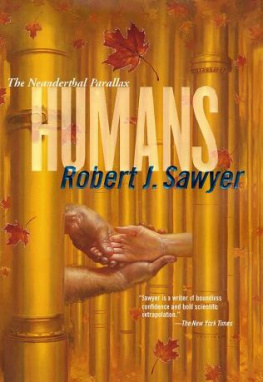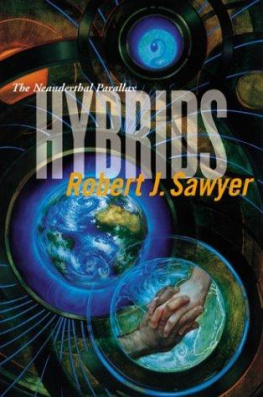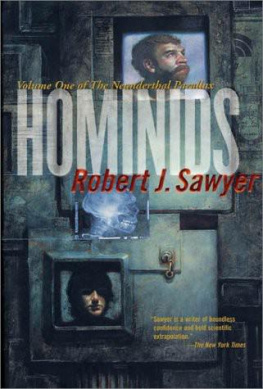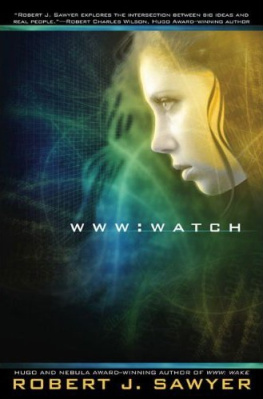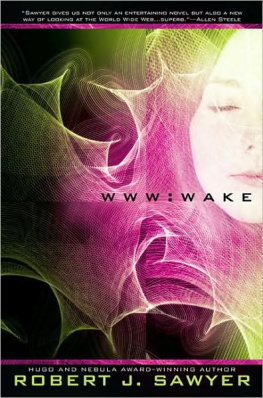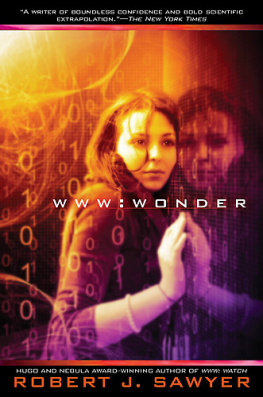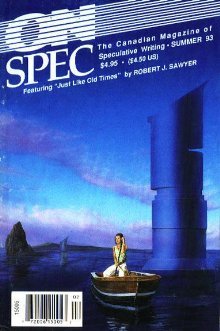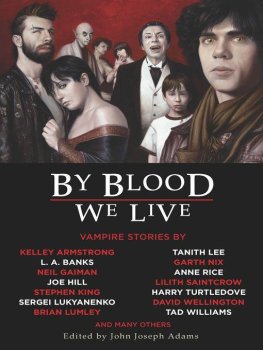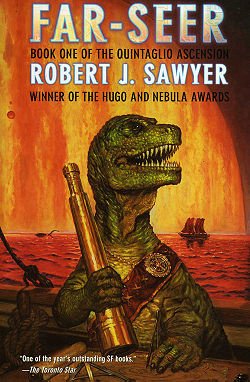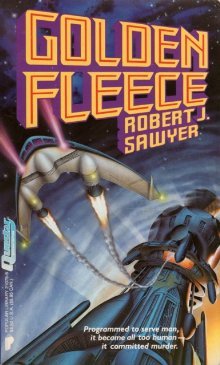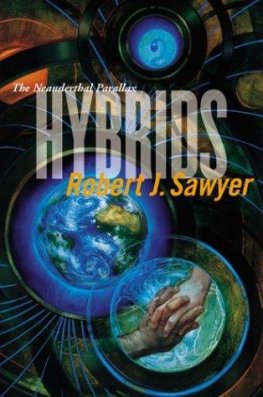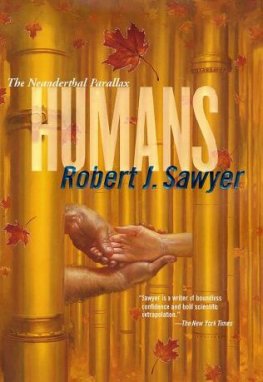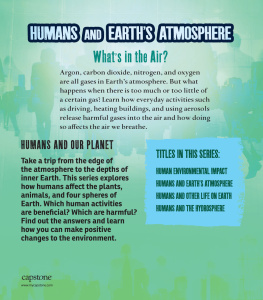Robert J. Sawyer, the award-winning and bestselling writer, hits the peak of his powers in Humans, the second book of The Neanderthal Parallax, his trilogy about our world and parallel one in which it was the Homo sapiens who died out and the Neanderthals who became the dominant intelligent species. This powerful idea allows Sawyer to examine some of the deeply rooted assumptions of contemporary human civilization dramatically, by confronting us with another civilization, just as morally valid, that has made other choices. In Humans, Neanderthal physicist Ponter Boddit, a character you will never forget, returns to our world and to his relationship with geneticist Mary Vaughan, as cultural exchanges between the two Earths begin.
As we see daily life in another present-day world, radically different from ours, in the course of Sawyer's fast-moving story, we experience the bursts of wonder and enlightenment that are the finest pleasures of science fiction. Humans is one of the best SF novels of the year, and The Neanderthal Parallax is an SF classic in the making.
Acknowledgments
For anthropological and paleontological advice, I thank Milford H. Wolpoff, Ph.D., University of Michigan; Ian Tattersall, Ph.D., and Gary J. Sawyer (no relation), both of the American Museum of Natural History; Philip Lieberman, Ph.D., Brown University; Michael K. Brett-Surman, Ph.D., and Rick Potts, Ph.D., both of the National Museum of Natural History, Smithsonian Institution; Robin Ridington, Ph.D., Professor Emeritus, University of British Columbia; and the various experts listed in the Acknowledgments to my previous book, Hominids.
Special thanks to Art McDonald, Ph.D., Director, Sudbury Neutrino Observatory Institute, and J. Duncan Hepburn, Ph.D., site manager, Sudbury Neutrino Observatory. Thanks, too, to Sudbury resident Kris Holland, who went over the manuscript with a fine-toothed comb.
Huge thanks to my lovely wife, Carolyn Clink; my editor, David G. Hartwell, and his associate, Moshe Feder; my agent, Ralph Vicinanza, and his associates, Christopher Lotts and Vince Gerardis; Tom Doherty, Linda Quinton, Jennifer Marcus, Jennifer Hunt, and everyone else at Tor Books; Harold and Sylvia Fenn, Robert Howard, Heidi Winter, Melissa Cameron, David Leonard, and everyone else at H. B. Fenn and Company; and my colleagues, Terence M. Green, Andrew Weiner, and Robert Charles Wilson.
Special thanks to Byron R. Tetrick, whose invitation to contribute to his landmark 2002 anthology, In the Shadow of the Wall: Vietnam Stories That Might Have Been (Cumberland House), led to me focusing my thoughts on several key issues; much of Chapter 22, in a different form, first appeared in that anthology.
Beta testers for this novel were the always insightful Ted Bleaney, Michael A. Burstein, David Livingstone Clink, Marcel Gagn, Richard Gotlib, Peter Halasz, Howard Miller, Dr. Ariel Reich, Alan B. Sawyer, and Sally Tomasevic, and I was fortunate enough to be working again with the copyediting team of Bob and Sara Schwager.
Parts of this book were written at John A. Sawyers vacation home on Canandaigua Lakethanks, Dad! Thanks, also, to Nicholas A. DiChario, my host on frequent visits to Rochester, New York, where some of this novel is set.
York University, the Sudbury Neutrino Observatory, and the Creighton Mine all really exist. However, all the characters in this novel are entirely the product of my imagination. They are not meant to bear any resemblance to the actual people who hold or have held positions with these or any other organizations.
If only there were evil people somewhere
insidiously committing evil deeds and it were
necessary only to separate them from the rest
of us and destroy them. But the line
dividing good and evil cuts through the heart
of every human being. And who is willing to
destroy a piece of his own heart?
ALEKSANDR SOLZHENITSYN
Prologue
Ive done a terrible thing, said Ponter Boddit, straddling the saddle seat in Jurard Selgans office.
Selgan was a member of generation 144, ten years older than Ponter. His hair was a wise gray, and his part had widened into a deep river of scalp, emptying onto the low forehead above his browridge. Go on.
I felt I had no choice, said Ponter, looking down, his own browridge shielding him from having to meet Selgans emerald eyes. I felt I had to do it, but
But you regret it now?
Ponter was silent, staring at the rooms moss-covered floor.
Do you regret it?
IIm not sure.
Would you do it again, if you had the moment to live over?
Ponter snorted a laugh.
Whats so funny? asked Selgan, curiosity, rather than irritation, in his voice.
Ponter looked up. I thought it was only physicists like me who engaged in thought experiments.
Selgan smiled. Were not so different, you and I. We each seek to find the truth, to solve mysteries.
I suppose, said Ponter. He looked at the smooth, gently curving wooden wall of the cylindrical room.
You havent answered my question, said Selgan. Would you do it again, if you could?
Ponter was silent for a time, and Selgan let him be silent, let him consider his answer. I dont know, Ponter said at last.
Dont you? Or is it that you simply do not wish to say?
Again, Ponter was silent.
I want to help you, said Selgan, shifting on his own saddle-seat. Thats my only goal. I wont judge you.
Ponter laughed again, but this time it was a rueful laugh. Thats the whole point, isnt it? Nobody judges us.
Selgan frowned. What do you mean?
I mean, in that other worldthat other Earththey believe there is awell, we have no word for it, but they call it God. A supreme, incorporeal being who created the universe.
Selgan shook his head. How can the universe have a creator? For something to be created, it has to have a beginning. And the universe didnt. It has always existed.
You know that, said Ponter. I know that. But they dont know that. They think the universe is onlywell, theyd say twelve billion years old; a hundred and fifty billion months or so.
Then what existed before that time?
Ponter frowned, remembering back to his conversations with the female Gliksin physicist Lou Benothow he wished he could pronounce their names properly! They say there was no time before then, that time began when the universe was created.
What an astonishing notion, said Selgan.

